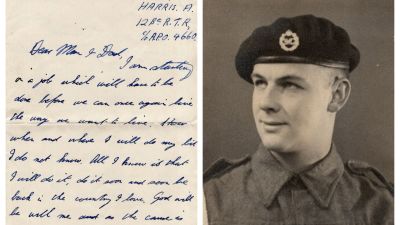'Cheeribye' - Heartbreaking letters from young Kent gunner donated to Dorset museum

A moving collection of letters written by a young tank gunner from Kent in World War Two has been given to The Tank Museum in Dorset.
The heartbreaking letters from God-fearing patriot and ‘cheerful’ optimist Alan 'Jim' Harris to his parents, written between 1940 and 1943, follow his training and deployment through to his death.
They highlight the agony so many families went through.
Donated to the Dorset museum, the letters have been catalogued and include several sent by his mother after her son had been killed.
Harris, from Ashdown, was just a teenage when he joined up in 1940 during the Blitz, starting as an ARP warden in London.
By 1941 he was training with the 60th Training Regiment and he became a good radio operator and gunner.
In what turned out to be a decision that would lead to his death, he declined the opportunity to become a gunnery instructor at Lulworth in Dorset, because he didn't think he'd make a good teacher.
He began training with the Royal Tank Regiment and in early 1943 he finally set sail for war, writing, "I am on a ship somewhere at sea! Where at sea I’ve not the vaguest idea."
Before his first action he wrote home in March 1943, "I will be taking soon the next step … But don’t worry, keep your chin up and don’t fear for me…"
"We’ve a good crowd of lads and together we’ll do all that is required of us and a bit more, so that soon we will be able to live as we want to, a righteous and sober life… living in a free and godly country."
"The cause is right and if the road be bumpy at times, I know that I can and will come through with flying colours."
He tells his parents that he is disappointed in North Africa, that the weather is like ‘English April showers’ but describes the scenery as ‘magnificent’.
In April 1943 Harris was in north-east Algeria with the 12th Royal Tank Regiment. During his first time in combat his tank took a direct hit from an anti-tank gun, killing him instantly.
Letters his mother sent him after this were returned, stamped with the message ‘It is regretted that this item could not be delivered because the addressee is reported missing.’
Some months later Jim’s troop leader wrote to his parents telling them how their son’s body had been recovered and buried.
Stuart Wheeler, Museum Historian, said, "This series of letters are very poignant but ultimately heartbreaking to read."
"They give an insight into how the war starts to impact on Jim’s life and those around him."
"Receiving letters like these are always significant as they add detail and colour to the story of the men who fought in tanks during World War Two and never returned home."
His nephew John Pullen, who donated the letters to the museum, said, "The letters remind us of the millions who made the sacrifice."
Want a quick and expert briefing on the biggest news stories? Listen to our latest podcasts to find out What You Need To Know...